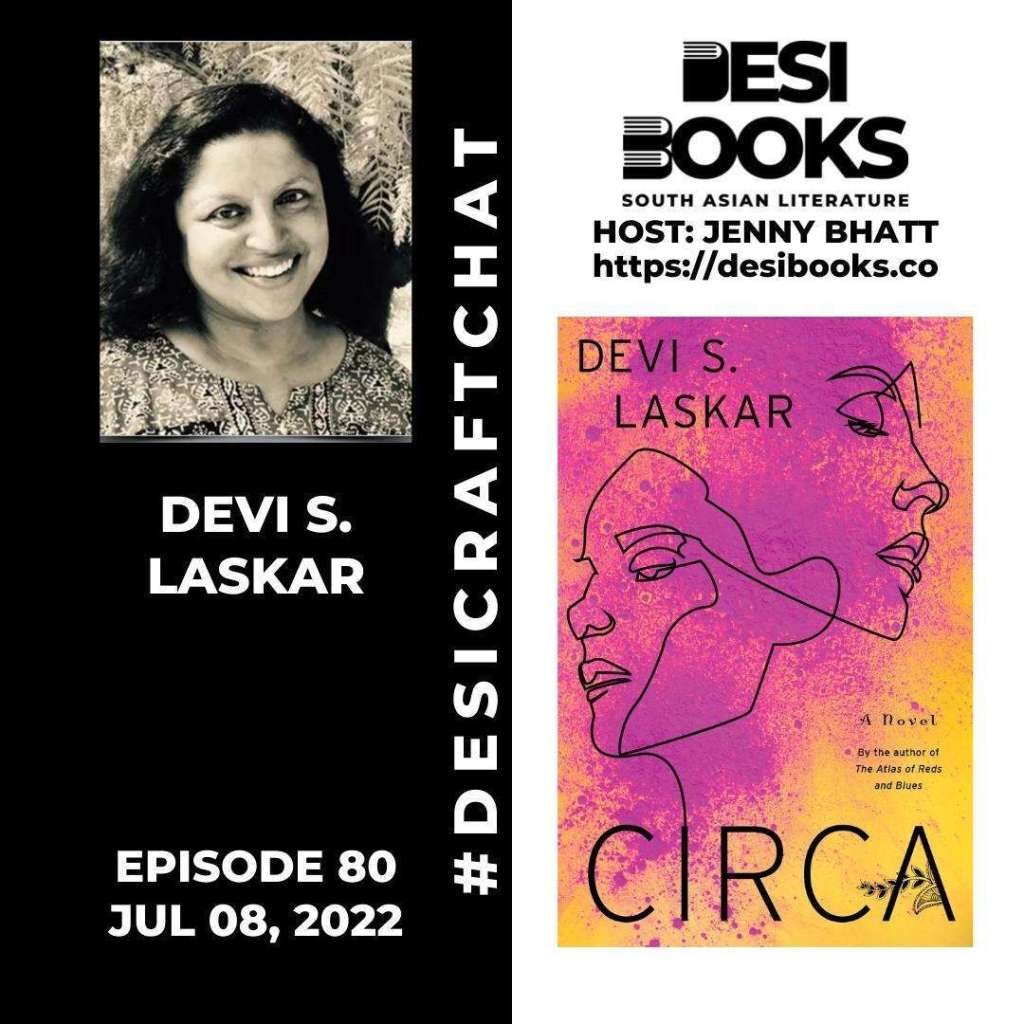

Desi Books Ep 80 w/ Devi S. Laskar – Desi Books
(available at Anchor.fm, Spotify, Soundcloud, Apple Podcasts, Castbox, Google Podcasts, Stitcher, TuneIn, Breaker, Pocket Casts, RadioPublic, Overcast)
Hello and welcome to Episode 80 of Desi Books—news and views about desi literature from the world over. I’m your host, Jenny Bhatt. Thank you for tuning in.
In today’s #DesiCraftChat, we have Devi S. Laskar discussing her new novel, Circa, and writing in the second person, how fiction can show a possible path out of grief, embracing how journalism informs her fiction and poetry, using the pendulum method to finish a book, what’s changed (or not) for older women writers of color, and much more.
#DESICRAFTCHAT WITH DEVI S. LASKAR — INTRODUCTION
Devi S. Laskar is the author of The Atlas of Reds and Blues, winner of 7th annual Crook’s Corner Book Prize (2020) for best debut novel set in the South, winner of the 2020 Asian/Pacific American Award for Literature & finalist for the Northern California Book awards. Her second novel, Circa, was published May 3, 2022, by Mariner Books. Her third novel, Midnight, At The War will be published by Mariner in early 2024. She holds degrees from Columbia University, University of Illinois and UNC-CH. A native of Chapel Hill, N.C., she now lives in California with her family.
Circa follows a young Indian American woman who, in the wake of tragedy, must navigate her family’s expectations as she grapples with a complicated love and loss. On the cusp of her eighteenth birthday, Heera and her best friends, siblings Marie and Marco, tease the fun out of life in Raleigh, North Carolina, with acts of rebellion and delinquency. They paint the town’s water towers with red anarchy symbols and hang out at the local bus station to pickpocket money for their Great Escape to New York. But no matter how much Heera defies her strict upbringing, she’s always avoided any real danger. Until one devastating night changes everything. In its wake, Marco reinvents himself as Crash and spends his days womanizing and burning through a string of jobs. Meanwhile, Heera’s dream to go to college in New York is suddenly upended. Over the years, Heera’s and Crash’s paths cross and recross on a journey of dreams, desires, jealousies, and betrayals. Heart-wrenching, darkly funny, and buoyed by gorgeous prose, Circa is at once an irresistible love story and a portrait of a young woman torn between duty and her own survival, between obligation and freedom.
Circa by Devi Laskar follows a young Indian American woman navigating tragedy, family expectations, duty, love, loss, and survival. #DesiCraftChat @DesiBooks
Tweet
On a personal note, what I’ve always enjoyed about Devi’s fiction is how she brings both her journalism and her poetry to bear on the writing and storytelling. While this book is different from her first novel, it’s still signature Laskar in those respects. I so appreciated this wide-ranging conversation, as you’re about to hear, with Devi about various aspects of writing craft and about the publishing world for older women writers of color.
Here’s Devi Laskar now.
#DESICRAFTCHAT WITH DEVI S. LASKAR
Excerpt from the interview:
Jenny Bhatt: I’m curious about the older you writing about the teenage Heera and this friendship that she has. What were maybe some of the epiphanies you had about teenage friendships as you were writing? Because again, you’re coming at it as a much older woman, as you said. So some of the things that you thought of differently now, writing as an older writer, than when you first began?
Devi S. Laskar: Oh, such a good question. You know, my little funny story about that is that the first time I was starting to write this, I was very young. So then I was writing it definitely, all from Heera’s point of view. And there was a lot more defiance, and “us against them”, and pitfalls that I find now to be a pretty stereotyped.
And so, then when I went back, I was like, oh, I have a chance here to let it all go and just really focus on telling a really good story and not try and anchor it to real life events. And also, because I’m older and I’m also identifying more with the parents, I have a chance to make this just as balanced as I can write and not make it as “against them” but make it more—I’ve had poetry teachers tell me over the years, you don’t want to write confessional work. That stuff, while it’s beautiful—and it can be beautiful—it’s different when you’re writing nonfiction, obviously. But in fiction, you don’t want to make it confessional.
What you really want to do is try and take the kernels and the seeds and make a myth, right? Make a story that’s just a really good story that’s got seeds in truth, but has suspense and anticipation. And to make it relatable, right? And I really hung on to that when I was writing this book. I let go of the real-life situation of her illness, and her death, and just made a story that really celebrates the friendship. And I think when you’re young, you’re so impressionable. Right? And when you have a setback, when you’re young, you recover, and it colors your lens, right, with the way you see your world. And I was trying to explore that as well.
“I let go of the real-life situation of her illness, and her death, and just made a story that really celebrates the friendship.” Devi S. Laskar on writing her novel, Circa. #DesiCraftChat @DesiBooks
Tweet
Jenny Bhatt: Do you think, in 2022, things are better in the publishing world, in terms of visibility for older women, writers of color, like us?
Devi S. Laskar: I don’t think much has changed, unfortunately. I mean, I think we’re more visible on Twitter but Twitter is not real. And I think publishing is still at 86% white and male, right? So I don’t think the needle has moved much. But all that to say that I really think that we now see each other more, right? Even though we’re in a pandemic, we have more community. And so I think that’s going to help, right, as we hold open the door for the new people who come after us. And as we hold each other’s work up and shout, right? There’s more of a shouting in unison and holding each other’s work up and saying: look, read this, read this. Right? So I think that part’s great. But Twitter isn’t real. So I don’t think that the needle has moved too much. [ . . .] And I just feel like we’re all inching along and we just gotta keep shouting out for each other and building community. And it will happen. It’s just not happened at the pace with which I would like. [. . .] But I do feel very hopeful that we’re getting there. I feel like, the more we can just be there for each other. Yes. And keep holding up each other’s books. [. . .] We’re just getting more chances. Right? We’re not gonna change the conversation, unfortunately, until we get a lot more people at the table. People who look like us, but also don’t look like us. Right? And I think we’re getting there but it’s just so slow.
Devi S. Laskar on older women of color and publishing: “I don’t think much has changed, unfortunately . . . we’re more visible on Twitter but Twitter is not real . . . [but] we now see each other more.” #DesiCraftChat @DesiBooks
Tweet
You’ve been listening to episode 80 of Desi Books—news and views about desi literature from the world over. I’m your host, Jenny Bhatt. Thank you for tuning in.
Today’s #DesiCraftChat was with Devi S. Laskar discussing her new novel, Circa, and writing in the second person, how fiction can show a possible path out of grief, embracing how journalism informs her fiction and poetry, using the pendulum method to finish a book, what’s changed (or not) for older women writers of color, and much more.
Episode 81 will be up shortly. Follow on Twitter @desibooks, Instagram @desi.books, Facebook @desibooksfb. Tag the accounts if you have requests or suggestions. Please go to the website if you’d like to sign up for the free, weekly newsletter. That’s desibooks.co. And please share this interview via social media so we can keep raising the tide of desi literature.
Stay healthy, keep reading, and write well.
Circa by Devi Laskar follows a young Indian American woman navigating tragedy, family expectations, duty, love, loss, and survival. #DesiCraftChat @DesiBooks
Tweet
Join the Conversation
